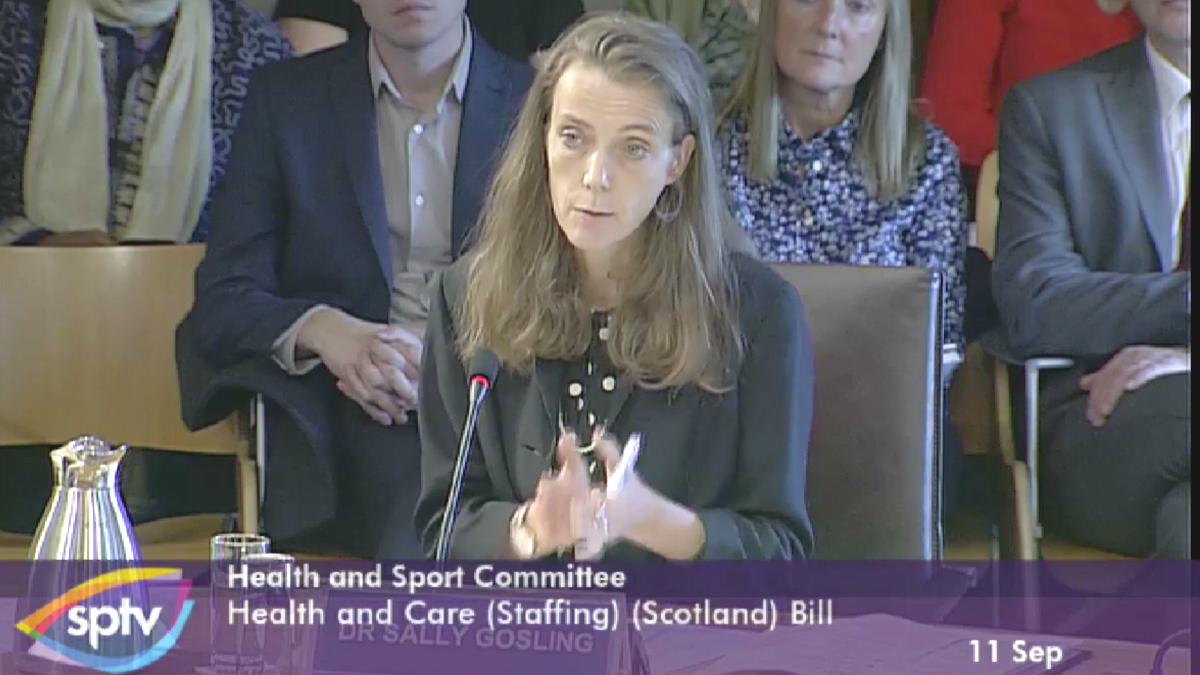The CSP has argued for significant changes to Scotland’s draft Health and Care Staffing Bill, to ensure it leads to safe, effective and sustainable care for patients.

Sally Gosling, CSP assistant director of practice and development, gave evidence to the Scottish Parliament today to outline the society’s concerns about the proposed legislation.
Speaking to a committee of MPs, she explained that the legislation could have unintended consequences and adversely affect patient care.
‘This legislation has risks for the quality of care provided to patients, in terms of both patient experience and patient outcomes,’ Dr Gosling said.
‘It risks focusing staffing levels legislation on one part of the workforce, while potentially depleting other parts of the workforce and adding to staff workloads in unhelpful and unintended ways.
‘It also assumes that looking at staffing levels in isolation will make a difference to the quality of care.
‘But we believe that a multidisciplinary team approach has to be taken to staffing levels, and looking at staffing levels in isolation cannot address these needs.’
Risk of distracting resources
In addition, the committee heard that the draft proposals might lead to services striving to demonstrate compliance with the legislation, rather than targeted their resources to address fundamental issues and needs.
‘The legislation risks being a distraction and could create bureaucracy, by investing staff time - for those staffing groups that would fall under the legislation - in gathering data about activity, but without a real focus about what the benefit of that would be.
‘So it may distract resources, making them focus more on meeting the needs of the legislation, rather than actually meeting service delivery or patient needs.’
A whole systems approach
Dr Gosling also warned that the legislation could lead to ‘rigid and inflexible’ staffing systems. To avoid this, she said the CSP was suggesting that the bill should adopt a ‘whole systems approach’ to staffing levels. This would better reflect changing models of service delivery, she explained, such as moving care closer to home and integrating health and social care delivery.
‘There is a need to focus on future service models and ensure staffing is able to meet current and future staffing service delivery models - rather than being grounded in historical models,’ said Dr Gosling.
Responding to changing needs
In her closing remarks to the committee, she suggested that the bill could benefit from an increased focus on implementing strategic workforce planning and development.
‘We recognise the spirit in which the legislation has been introduced and that it is intended to enhance patient care and address issues of staff wellbeing.
‘But as it is currently couched we don’t believe it will do that. It needs to be much more responsive to changing population needs and more aligned with health and care policy.
‘So, if the legislation was to be progressed we would want to have some direct involvement in how that is done.
‘We have a lot to add to how it could be done differently, especially in line with a whole systems approach and a multidisciplinary team approach.’
The CSP previously outlined its concerns in a written submission to the committee.
Author: Robert Millett
Find Out More
Number of subscribers: 2



































